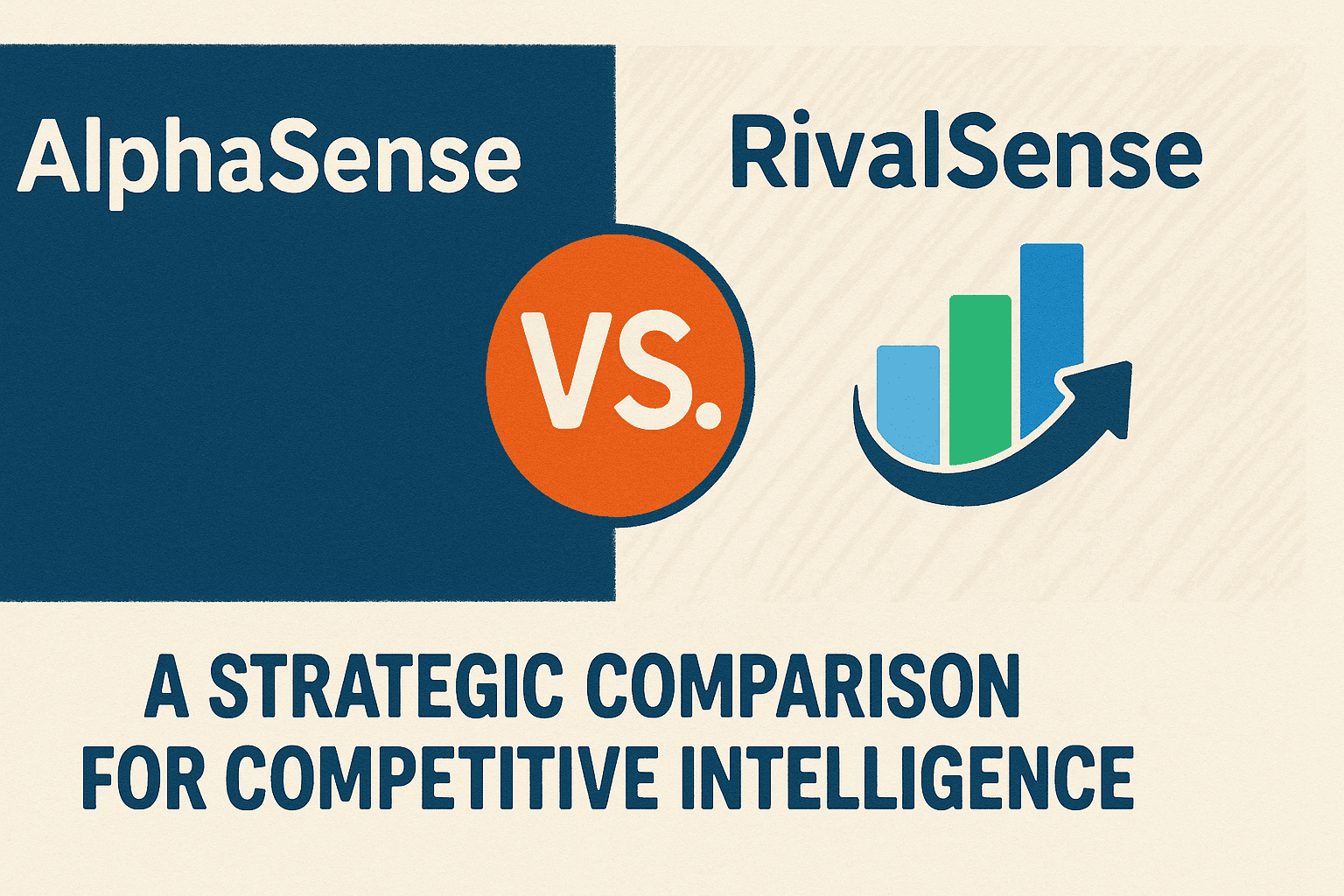AlphaSense vs. RivalSense: A Strategic Comparison for Competitive Intelligence

Choosing the right competitive intelligence (CI) platform depends on balancing depth, affordability, and usability. Below is an analysis of AlphaSense—a market intelligence leader—and RivalSense, a rising AI-powered competitor tracker, to help teams identify the best fit for their needs.
AlphaSense: Strengths
- Comprehensive Market Intelligence
AlphaSense aggregates data from 10,000+ sources, including SEC filings, broker research, earnings transcripts, and proprietary content like Wall Street Insights® and 185,000+ expert call transcripts. This breadth supports deep financial analysis, M&A due diligence, and corporate strategy development. - Advanced AI & NLP Capabilities
Features like Smart Synonyms™ (context-aware search), sentiment analysis, and generative AI tools (e.g., Smart Summaries for earnings reports) streamline research workflows. Its proprietary Large Language Model (ASLLM) outperforms third-party models in business contexts. - Enterprise-Grade Integrations
AlphaSense integrates with tools like SharePoint, Box, and Salesforce, and offers APIs for custom workflows. It also supports internal content indexing, enabling unified searches across proprietary and external data. - Proven Track Record
Trusted by 85% of S&P 100 companies and top asset management firms, AlphaSense is praised for its accuracy, real-time alerts, and ability to surface niche insights from expert interviews.
Weaknesses
- High Cost & Opaque Pricing: Custom quotes and enterprise-tier pricing make it inaccessible for smaller teams.
- Complexity: Steep learning curve and limited visualization tools may deter non-technical users.
- Collaboration Constraints: Features like Notebook+ are restricted to licensed users, hindering cross-team workflows.
RivalSense: Strengths
- Affordable, Transparent Pricing
Plans start at 44.99/month (Basic tier), scaling to 222.99/month (Business tier), with no hidden fees. This contrasts sharply with AlphaSense’s custom enterprise pricing. - Curated, Actionable Insights
Tracks 80+ data sources (websites, LinkedIn, job boards) and delivers weekly briefings via Slack or email, focusing on competitor moves like pricing changes, hiring trends, and product launches. AI filters reduce noise, prioritizing high-impact updates 3. - User-Friendly Automation
Automated alerts and a searchable archive simplify tracking multiple competitors. Users can monitor up to 20 companies in the Business plan, ideal for SMBs needing agility. - Rapid Deployment
No lengthy onboarding—teams can start tracking competitors within hours. Integrations with Slack and role management tools enhance accessibility.
Weaknesses
- Limited Depth: Lacks access to financial filings, broker research, or expert transcripts, making it unsuitable for in-depth financial analysis.
- Data Accuracy Issues: Occasional inconsistencies and lagging interface performance.
- Narrow Focus: Primarily a competitor tracker, not a holistic market intelligence platform.
Why Choose RivalSense Over AlphaSense?
- Cost Efficiency
RivalSense’s pricing is 70–90% lower than AlphaSense’s enterprise plans, making it viable for startups and SMBs. - Simplicity vs. Complexity
RivalSense’s streamlined interface and automated briefings suit teams prioritizing speed over granular analysis. AlphaSense’s depth is overkill for basic competitor tracking. - Dynamic Competitor Monitoring
For real-time alerts on hiring, pricing, or product launches, RivalSense’s agility outperforms AlphaSense’s manual workflows. AlphaSense excels in historical financial data but lags in real-time CI. - Sales & Marketing Alignment
RivalSense’s battlecards and Slack integrations help sales teams act swiftly on competitor moves. AlphaSense, while robust, lacks dedicated sales enablement features.
When to Stick with AlphaSense
- Financial & Expert Analysis: Critical for investment firms, Pharma, and enterprises needing expert transcripts or broker reports.
- Regulatory Compliance: SEC filings and global regulatory data are irreplaceable for legal and compliance teams.
- Sentiment & Risk Management: Advanced NLP tools track market sentiment shifts, aiding long-term strategy.
Conclusion
AlphaSense dominates for enterprises requiring exhaustive financial and market intelligence. However, RivalSense emerges as a cost-effective, user-friendly alternative for teams focused on competitor tracking and rapid decision-making. By prioritizing affordability and curated insights, RivalSense empowers SMBs and agile teams to stay ahead without the complexity or cost of enterprise platforms.
